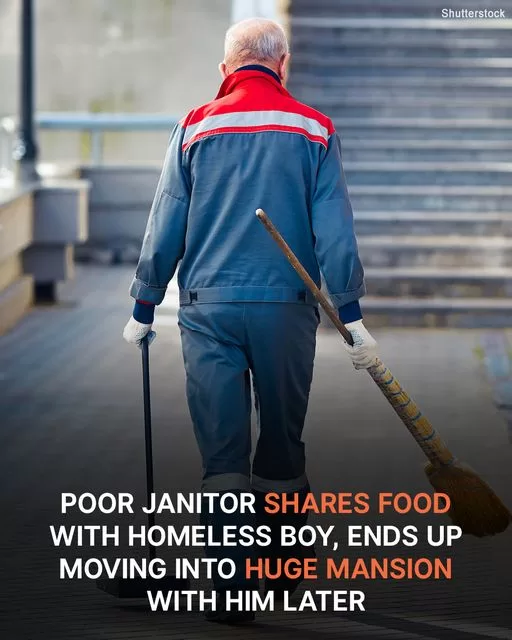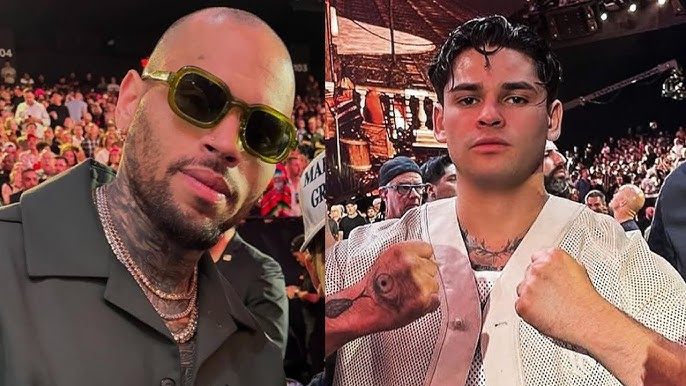Patrick, a poor janitor, was on his way to buy lunch after finishing his shift at the local supermarket. As he made his way to the cash register, a scruffy-looking teenager, about 16 years old, bumped into him. The boy snapped at Patrick, calling him a jerk, but his frail appearance told Patrick that the kid was likely homeless.
Unfazed, Patrick ordered a slice of pizza and a soda. Christine, the cashier, commented on his declining health and urged him to eat better. Patrick, pulling out his wallet to pay, realized it was missing. Panic set in until the boy who had bumped into him earlier approached, holding Patrick’s wallet.
“Is this yours?” the boy asked.
Relieved, Patrick thanked him and, as a gesture of gratitude, offered to buy the teen lunch. The boy reluctantly agreed, and they sat down together to eat.
As they ate, Patrick couldn’t shake the feeling that he had seen the boy before. “What’s your name?” he asked.
The boy hesitated. “I don’t remember. I have amnesia,” he replied.
Intrigued, Patrick asked the boy about the last thing he could remember. The boy explained that five or six years ago, he had woken up in a strange man’s car, unsure of how he got there. After that, he found himself living under a bridge with homeless people who discouraged him from seeking help, telling him his parents had likely abandoned him.
Patrick listened intently, asking if the boy had ever tried to figure out who he was. The boy explained that he had stayed with the homeless group, helping them with petty crimes to survive, but eventually, he had grown tired of that life and struck out on his own.
“Did you steal my wallet?” Patrick asked with a knowing smile.
The boy grinned. “I don’t rob the poor. I overheard your conversation with the cashier, and I felt bad, so I gave it back.”
The two continued talking, and the boy revealed that people called him “Double U” because of a strange W-shaped scar on his arm. When he showed Patrick the scar, something clicked.
Patrick suddenly remembered where he had seen the boy before. “I know you! Six years ago, I worked as a janitor at a private school for wealthy kids. You were part of a group that called themselves ‘The Wolves’ and carved that ‘W’ on your arm. I know your family. You’re from a wealthy background, and your home is about 500 miles away in Iowa. I can take you to the police, and they’ll contact your parents.”
Skeptical but intrigued, the boy agreed to travel with Patrick, but insisted they do it without involving the police.
The next day, Patrick and the boy hitchhiked to Iowa, and after a long journey, they arrived at a grand estate. As they approached the house, Patrick reassured the boy that this was indeed his home.
When they rang the doorbell, a man answered, stunned to see the boy. “Dylan? You’re home!” he cried, embracing the boy. The man, who introduced himself as Dylan’s uncle Harold, invited them inside. However, Patrick noticed something unsettling about Harold’s behavior.
As they settled in, Harold offered them drinks, spiking their orange juice with sleeping pills. Distracting them with a story about Dylan’s parents dying in a car accident, Harold watched as both Patrick and Dylan grew drowsy and eventually passed out.
Patrick woke up hours later, chained to a radiator in a dark bathroom. Panicking, he realized Dylan was nowhere to be found. Recalling the last moments before he passed out, Patrick suspected Harold had sinister intentions.
Desperate to free himself, Patrick dislocated his thumb to slip out of the cuffs, enduring immense pain. Once free, he began searching the house for Dylan. In one of the rooms, he stumbled upon several cases filled with money. For a moment, Patrick considered taking the money and fleeing, but his conscience wouldn’t allow him to leave Dylan behind.
Suddenly, Patrick heard Harold’s voice from the basement, confirming his worst fears. Harold had taken Dylan captive and planned to kill him. Steeling himself, Patrick decided to create a diversion. He tossed his belt upstairs to make noise, luring Harold away from the basement.
Seizing the opportunity, Patrick rushed downstairs and freed Dylan. They escaped through a window, but as they ran through the woods, Patrick twisted his leg and couldn’t continue. Dylan insisted on carrying him, but their escape was interrupted when they heard Harold’s car approaching.
Patrick urged Dylan to run for help while he stayed behind to distract Harold. Reluctantly, Dylan agreed and bolted towards the road.
Harold soon caught up with Patrick, pointing a gun at him. As Harold prepared to shoot, a stone hit him from behind, thrown by Dylan, who had returned. Taking advantage of Harold’s distraction, Patrick tackled him to the ground, and together with Dylan, they tied him up and called the police.
At the station, Harold confessed to everything. He had indeed found Dylan after the car accident that killed his parents but, instead of taking him to the hospital, Harold had taken advantage of Dylan’s amnesia to steal the family fortune.
With Harold in custody, Dylan was free to reclaim his life. As they left the station, Patrick prepared to say goodbye, but Dylan stopped him.
“I wouldn’t want to start a new life without you,” Dylan said, placing the mansion’s keys in Patrick’s hand. “Let’s go home.”
As Dylan placed the mansion’s keys in Patrick’s hand, Patrick stood frozen, unsure how to respond. He had never imagined stepping into a world of luxury—his world was one of hard work, long hours, and simple meals. Yet here was Dylan, a boy who had lived through unimaginable hardship, offering him a place in a life he never thought he could have.
“Dylan,” Patrick started, shaking his head, “this is your home. I’m just a janitor, a simple man. You don’t owe me anything.”
Dylan looked at him seriously. “Patrick, you saved my life. I’ve been through so much, and I don’t even know who I am anymore. I need someone I can trust—someone who has shown me real kindness. You’re more than just a janitor. You’re my family now.”
Patrick’s heart swelled with emotion. He had never felt so appreciated or needed in his life. His first instinct was to decline, to go back to the routine of his quiet, lonely existence. But looking at Dylan—this young man who had been abandoned, who had been used, who had fought so hard for his freedom—Patrick knew he couldn’t turn his back on him.
“Alright,” Patrick said softly, his voice thick with emotion. “Let’s go home.”
The mansion was even more breathtaking inside than Patrick had imagined. Lavish rooms with high ceilings, elegant chandeliers, and expansive windows made the place feel almost unreal. But Dylan, for all the wealth surrounding him, didn’t seem to care about the luxury. He just seemed relieved to have a safe place to call his own.
Over the next few weeks, Dylan worked closely with the authorities to sort out the mess Harold had left behind. The legal process of reclaiming his inheritance and tying up loose ends was exhausting, but through it all, Dylan insisted that Patrick stay by his side. They shared meals, laughter, and conversations about life, and their bond grew stronger by the day.
Patrick began to realize that this new life wasn’t about money or material things for Dylan. What Dylan truly craved was a sense of family, and Patrick had unknowingly filled that role for him. And for Patrick, who had spent most of his life alone, it felt good to have someone to care for, someone who genuinely valued his presence.
As the months passed, the two of them settled into a comfortable routine. Patrick, still humble and practical, took on the role of managing the estate, making sure everything ran smoothly. He couldn’t bring himself to fully retire from working; it wasn’t in his nature. But this time, his work had meaning. He wasn’t just cleaning floors or stocking shelves—he was building a home for someone who needed him.
Dylan, now free from his painful past, began focusing on his future. He enrolled in classes, eager to catch up on his education, and started making plans to use his wealth for good. He dreamed of opening a center for homeless teens, a place where they could find shelter, education, and hope—just as Patrick had given him.
One evening, as they sat together in the grand living room, Dylan turned to Patrick with a thoughtful look.
“You know, Patrick,” he said, “I don’t think I’d be here today if it weren’t for you. You gave me more than just a meal that day—you gave me a second chance.”
Patrick smiled warmly. “I think we gave each other a second chance, Dylan.”
And in that moment, they both knew that home wasn’t just about where you lived—it was about the people you shared it with. Together, they had found not only a house but a family, a future, and a place where they both truly belonged.
And so, as the days turned into years, Patrick and Dylan built a new life together—one filled with purpose, love, and the unbreakable bond of two people who had saved each other in more ways than one.








